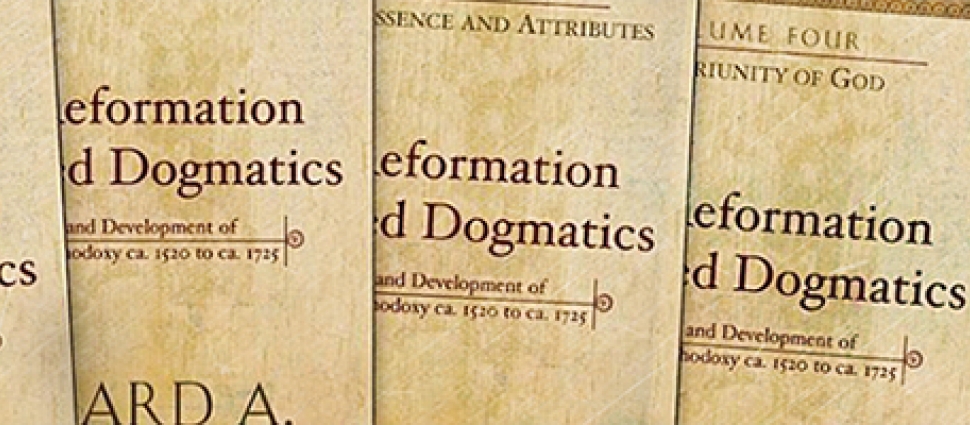A Year in PRRD (Week 6)

Every Wednesday in 2018, Michael Lynch (PhD candidate at Calvin Theological Seminary) and our own editor Danny Hyde (PhD candidate at Vrije Universiteit Amsterdam) will be blogging through Richard Muller’s Post-Reformation Reformed Dogmatics, 4 vols. (2nd edition, Grand Rapids: Baker Academic, 2003).
These volumes are currently out-of-print but used copies can be found online here. For a schedule of weekly readings, go here.
Week 6 (2/5-2/11): I.2.5 (pgs. 221–269)
In one of the great modern westerns, Tombstone (1993), there is a conversation between two of the wild West's deadliest gunslingers...in Latin! The text of what Doc Holliday and Johnny Ringo say is full of subtext. But it's the first line by Doc Holliday (Val Kilmer) that sets the tone: in vino veritas, "in wine there is truth." Not only were Doc's words literally true as he was drunk, but they had the subtext that what he just said about hating Ringo was truly true.
What's theology? What does God know? What can we know? How do we know what we know? How do we know what we know is true? And how do we express it? That's what this week's reading is all about. Muller deals with the Reformed Orthodox discussion of the parts of true theology, so helpfully distinguished by Franciscus Junius as theologia archetypa, God's own knowledge of himself, and theologia ectypa, what we know of God. Let me encourage you to dive into Junius yourself Latíne and in Reformation Heritage Books' recently published English translation (hardcover or ebook).
Why this distinction? One of the insights Martin Luther rested on was the late medieval critique of Thomas Aquinas by men like John Duns Scotus. Aquinas said there was an anaology of being between God and man; Scotus said it was impossible for man to derive a description of God apart from an authoritative testimony from God himself. Hence Luther's theology of the cross—what God revealed—took precedence over the theology of glory—what God has kept hidden. John Calvin added to this the radical effects of original sin upon the mind of man so much so that apart from God's self-revelation, true knowledge of God is inaccesible to us. Therefore, Reformed Orthodox writers distinguished theology as God knows it (theologia archetypa) from theology as we creatures can know it (theologia ectypa), whether in this life as pilgrims (theologia viatorum) or the life to come (theologia beatorum). In other words, we as creatures before the Fall, after the Fall in sin, after redemption in Christ, and even in glory, are limited in what we can know of God. We know what God knows is reality; and what we can know is tethered to whatever he decides to reveal to us in a manner appropriate for our creaturely capacity.
Why is this distinction important? Let me illustrate. Currently I am preaching through the Gospel of John. The "prologue" (see P. J. Williams' critique of this terminology and concept) ends with this coup de grâce in 1:18: "No one has ever seen God; the only God [Son], who is at the Father’s side, he has made him known" (ESV). The eternal Word (1:1-3) and Son (1:14) who became flesh and tabernacled among humanity as Jesus Christ (1:17) alone has been at the Father’s side or as our older translations put it, “in the bosom of the Father,” that secret place of perfect fellowship and intimacy. Therefore he alone has seen the Father. No creature has seen or known God in himself in perfection; only the Son, who is the same essence as the Father as God, has. God alone as archetypal theology. In fact, the contrast is made between the Son and Moses, who could not see God and live and so was hidden in a cleft of a rock (Ex. 33:18–20) and who said to the Lord, “I tremble” (Heb. 12:21; Ex. 19:16; Deut. 9:19). On the contrary, the Word (v. 1), the only Son (v. 14), the only God (v. 18) has seen the Father and lived to tell the story to us! In fact, John tells us this is why the Son came from fellowship with the Father into fellowship with us in our humanity; he came to reveal God. And this revelation is the Gospel or good news to fallen creatures like us. Our theology (theologia nostra) is derived from God's own revelation of himself in Christ. And how did the Son in flesh reveal the Father? In a manner suited to our capacity: in words like parables and sayings and in miraculous signs meant to point beyond themselvbes to truths about Him. So verse 18 of John 1 comes full circle to verse 1: the Word who was with God (v. 1) is at the Father’s side in his bosom (v. 18); the Word who was God (v. 1) is the only God [Son] (v. 18); the Word (v. 1) or self-expressive revelation of God has made the Father known (v. 18)—ἐξηγήσατο—has exegeted or explained the Father to us! What a Gospel!
Doc Holliday said in vino veritas; Jesus said ἐγώ εἰμι…ἡ ἀλήθεια: "I am the truth" (John 14:6).
And they say this stuff is stale!
Join us next Wednesday as Michael Lynch blogs through the reading for Week 7 (2/12-2/18): I.2.6 (pgs. 270–310).
Meet the Puritans is a conversation of the Alliance of Confessing Evangelicals. It is supported only by its readers and gracious Christians like you. Please prayerfully consider supporting us.
For previous posts in this series, see:





